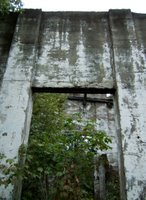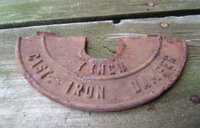 Built on Parry Island on Georgian Bay by lumber king John Rudolphus Booth of Ottawa, the port of Depot Harbour served as the western terminus of the Ottawa, Arnprior & Parry Sound Railway. Mr. Booth's private rail line transported timber (read "old growth") and grain in the west to ports on the Atlantic.
Built on Parry Island on Georgian Bay by lumber king John Rudolphus Booth of Ottawa, the port of Depot Harbour served as the western terminus of the Ottawa, Arnprior & Parry Sound Railway. Mr. Booth's private rail line transported timber (read "old growth") and grain in the west to ports on the Atlantic.First a quick note about this lumber king. J.R. Booth, a young entrepreneur of 32, in 1859, won the contract to supply the wood for the construction of the Parliament buildings. By 1870, he employed 2,000 men to work his mills, and 4,000 lumbermen to cut the trees to feed these mills. Initially, Mr. Booth purchased land from the Ojibway on Parry Island but later expropriated additional territory from the reserve using a little-known provision of the Railway Act. In 1895, the Ojibwa of Parry Island were forced to sell approximately 300 acres for a meagre $ 9.00 an acre.

Given this treatment, it is with some wonderment that Parry Island had produced Canada's most highly decorated aboriginal soldier, Cpl. Francis Pegahmagabow (1891-1952). Mr. Pegahmagabow was awarded the Military Medal three times; was an expert marksman and scout, and is credited with killing up to 378 Germans and capturing 300 more in the Great War.
 Anyway, I digress - back to the Ghost Town. The elevators / silos had boasted quite a large capacity of 1,500,000 bushels, and in fact, in 1905, the port witnessed more traffic than other other Canadian Great Lake port. (32,777 tons Flour / 3,710,087 bushels Corn / 108,000 bushels Wheat / 1,893,800 bushels Oats / 46,000 bushels Barley (mmm. . . barley). There were, at its peak in 1926, approximately 147 students attending the two-storey Depot Harbour School with a population of 1,600 permanent residents.
Anyway, I digress - back to the Ghost Town. The elevators / silos had boasted quite a large capacity of 1,500,000 bushels, and in fact, in 1905, the port witnessed more traffic than other other Canadian Great Lake port. (32,777 tons Flour / 3,710,087 bushels Corn / 108,000 bushels Wheat / 1,893,800 bushels Oats / 46,000 bushels Barley (mmm. . . barley). There were, at its peak in 1926, approximately 147 students attending the two-storey Depot Harbour School with a population of 1,600 permanent residents.
A quick note on the Cosmic Karma Bomerang and Mr. J.R. Booth. In 1933, a large deluge of water weakened the foundations of the connecting trestle between Cache Lake and Lake of Two Rivers. The estimated cost to repair the steel trestle was a cool half-million dollars, which at the time of the Great Depression, was at the very least, quite a bit of dough. The CNR, with competing interests, did not consider the repair of this bridge very important and promptly applied to the Feds for funds. The Prime Minister of the time, Mr. Bennett, being a tight-a$$ conservative, then promptly turned down the railway's request. This, we should forgive in light of it being the depression which resulted in the ubiquitous 'Bennett Buggy' (for the younger readers, just Google image search this). Anywho, due to the condemned trestle, this line was no longer the shortest route from the Upper Great Lakes to the hungry markets on the eastern seaboard.
 During the latter days of World War Two (the evening of 14th August, 1945 exactly), some of the grain elevators at Depot Harbour were being decommissioned and a labourer's favourite break-time habit is smoking tobacco. Unfortunately, adajacent wharehouses at this time were being used to store our favourite smokeless propellant, cordite (which was manufactured in nearby Nobel) and wool (the fluffy stuff that grows on sheep). The resulting explosion and fire, which followed, allowed ample light for newpaper readers in nearby Parry Sound.
During the latter days of World War Two (the evening of 14th August, 1945 exactly), some of the grain elevators at Depot Harbour were being decommissioned and a labourer's favourite break-time habit is smoking tobacco. Unfortunately, adajacent wharehouses at this time were being used to store our favourite smokeless propellant, cordite (which was manufactured in nearby Nobel) and wool (the fluffy stuff that grows on sheep). The resulting explosion and fire, which followed, allowed ample light for newpaper readers in nearby Parry Sound.
After World War Two, the Century Coal Company took over the dock space previously occupied by the grain elevators. The company continued operations until 1951 at which point coal was less important as fuel )the R.L. Hearn Plant and the Sir Adam Beck 2 Hydro-electric developments were taking place during this time). Subsequently, when the Century Coal Company closed down its operation at Depot Harbour the town had lost its last source of revenue.
 The Depot Harbour storey ends on a decidedly sour note, as with most 'boom and bust' towns. The Depot Harbour school, with a staff of two finally closed in 1954. Nature began to erase all evidence of human settlement and industry. The Ojibway reclaimed the expropriated lands in 1987. The Wasauksing First Nation had filed 3 claims since to Indian and Northern Affairs Canada since 1996.
The Depot Harbour storey ends on a decidedly sour note, as with most 'boom and bust' towns. The Depot Harbour school, with a staff of two finally closed in 1954. Nature began to erase all evidence of human settlement and industry. The Ojibway reclaimed the expropriated lands in 1987. The Wasauksing First Nation had filed 3 claims since to Indian and Northern Affairs Canada since 1996.
1 comment:
Great info on DH! Last weekend when I was up there, I noticed that the big diesel shovel is now gone..
Post a Comment